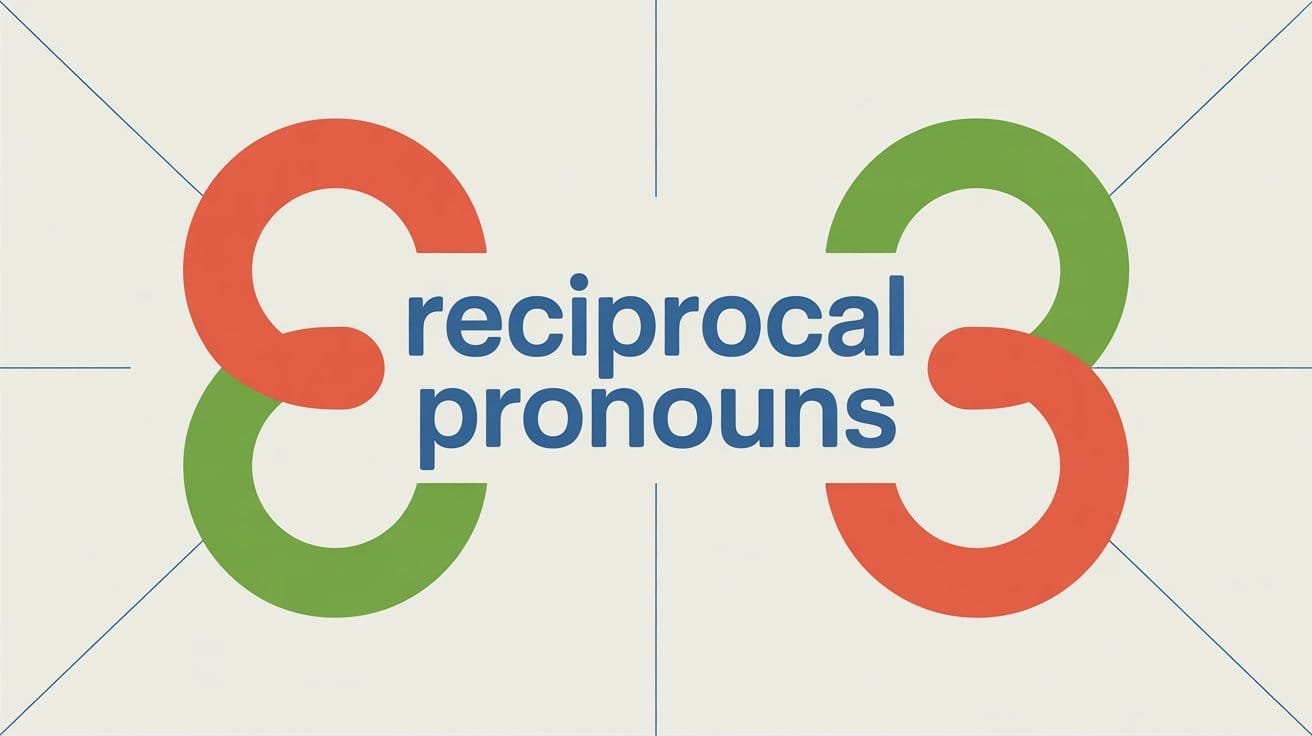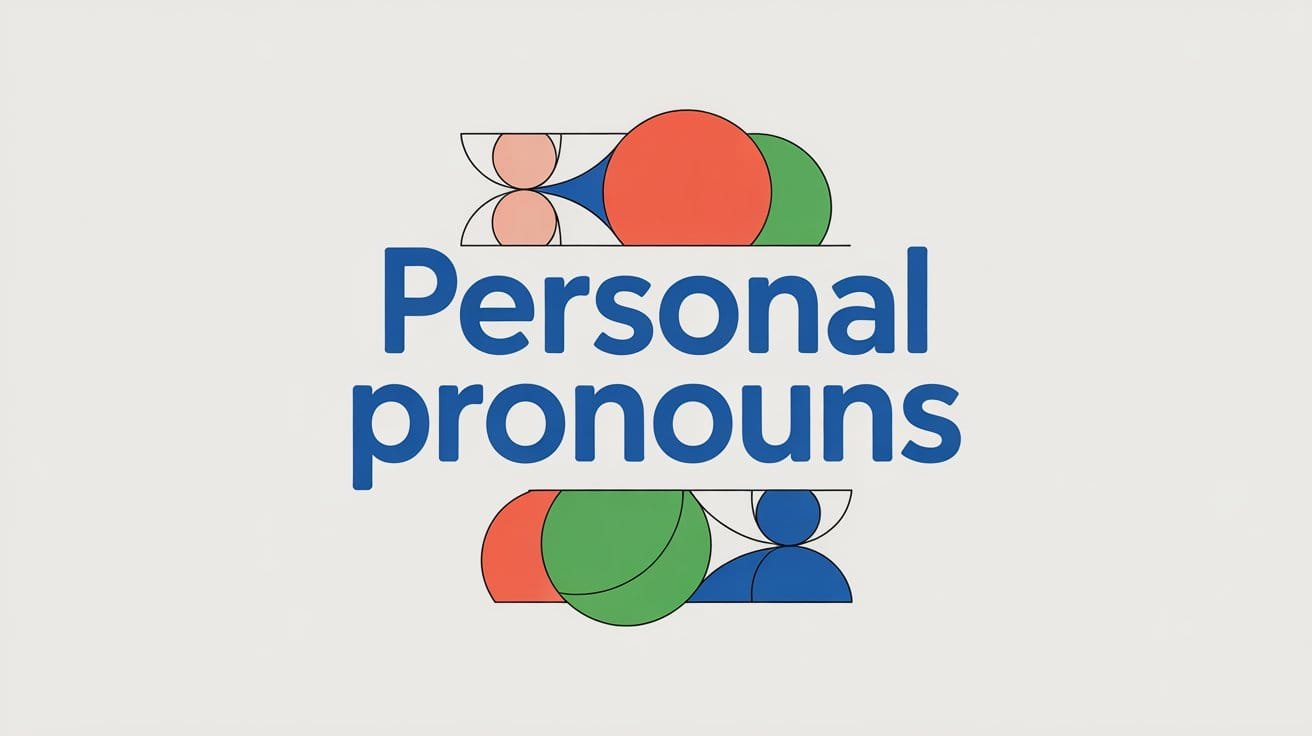Reciprocal pronouns are used when two or more people perform the same action toward one another. They help you avoid repetition and make sentences sound clearer and more natural. Instead of repeating names or pronouns, reciprocal pronouns show that the action moves in both directions.
Reciprocal pronouns appear often in everyday communication, especially when talking about cooperation, feelings, or interactions between people, which makes correct usage important for clear meaning.
What Are Reciprocal Pronouns?
Imagine two friends giving each other a high-five or two siblings sharing a secret. Reciprocal pronouns step in when actions bounce back and forth between people or things. They help us express mutual actions or relationships.
Reciprocal Pronoun Definition
A reciprocal pronoun is a type of pronoun that expresses a mutual relationship or action between two or more individuals, entities, or things. Reciprocal pronouns are used to indicate that the action or feeling is reciprocated, meaning it goes both ways. They highlight the give-and-take, interaction, or shared experiences among the subjects mentioned in a sentence. Reciprocal pronouns include “each other” and “one another.”
Common Reciprocal Pronouns: Each Other and One Another
Reciprocal pronouns come in two flavors: “each other” and “one another.” But how do you know which one to use? It’s all about the number of entities involved. Use “each other” when referring to two individuals or things. If there are more than two, opt for the versatile “one another.”
Here’s a simple table to remember:
| Number of Entities | Reciprocal Pronoun |
| Two | Each other |
| More than two | One another |
Reciprocal Pronoun Examples: Using Reciprocal Pronouns in Sentences
Reciprocal pronouns aren’t just theoretical constructs—they’re the secret ingredients that make your sentences sizzle with shared experiences. Let’s delve into how to seamlessly weave “each other” and “one another” into your conversations.
Imagine two friends, Sarah and Alex. They’re supporting each other in a tough time. Here, “each other” shines as it spotlights the mutual exchange of support between these two individuals. It’s like a linguistic hug that conveys their shared comfort.
Now, let’s zoom out to a larger scenario. Picture a band of musicians rehearsing for a concert. They’re collaborating, inspiring one another, and creating a harmonious performance. This is where “one another” enters the stage. It gracefully captures the beautiful give-and-take among the group, emphasizing a collective exchange of ideas, motivation, and creativity.
Reciprocal Pronoun Examples in Action:
- “Sarah and Alex are always there for each other, offering a helping hand whenever needed.”
- “Before reaching a solution for a disagreement, they try to find a way to understand one another’s perspectives.”
- “The musicians in the orchestra encourage one another during rehearsals, resulting in breathtaking musical compositions.”
- “During group study sessions, the classmates help each other grasp complex concepts, making learning effective and enjoyable.”
In these examples, reciprocal pronouns enhance the narrative by highlighting the bonds and interactions between individuals or entities. They add depth and authenticity to your sentences, offering a window into the dynamics of relationships and shared moments.
When to Choose “Each Other” or “One Another”
Navigating between “each other” and “one another” may seem like treading on subtle linguistic terrain, but fear not! Let’s break down when to use each pronoun and how their usage impacts your message.
“Each Other”:
Picture a dynamic duo, like two peas in a pod. When you’re talking about a mutual action or feeling between two individuals or entities, “each other” is your loyal companion. It’s like a spotlight that illuminates the interaction happening exclusively between those two.
Examples:
- “Jenifer and her best friend Alex tell each other about their dreams and aspirations.”
- “The best friends finish each other’s sentences, showing a level of closeness where they can predict each other’s words.”
“One Another”:
Now, imagine a collective scenario where interactions extend to a group. If your sentence involves three or more people, “one another” steps onto the stage. It encapsulates the shared experiences among a larger set of individuals, like a symphony of connections.
Examples:
- “At the family reunion, cousins greeted one another with warm hugs and laughter.”
- “During the book club meeting, readers discussed their interpretations of the novel, gaining new insights from one another’s perspectives.”
Remember, the choice between “each other” and “one another” is rooted in the number of participants involved in the mutual action or relationship. It’s like tailoring your words to fit the size of the social gathering you’re describing.
So, if there are two people, go for “each other.” When there’s a bigger bunch—three or more—reach for “one another.” By selecting the right pronoun, you effortlessly guide your readers or listeners into the heart of the interactions you’re portraying.
Reciprocal Pronouns in Questions and Negations
Now that you’re well-versed in using reciprocal pronouns in sentences, let’s unravel how they shine in questions and negations. These linguistic tools add depth to inquiries and allow you to express the absence of shared actions or relationships.
Reciprocal Pronouns in Questions:
Forming questions with reciprocal pronouns is a breeze. The beauty lies in their simplicity—they retain their form regardless of whether they’re in a statement or a question.
Examples:
- Statement: “They trust each other’s judgment.”
Question: “Do they trust each other’s judgment?“
- Statement: “The neighbors in this area often visit one another.”
Question: “How often do the neighbors in this area visit one another?“
Notice how the reciprocal pronouns seamlessly transition from statements to questions, making your inquiries engaging and clear.
Reciprocal Pronouns in Negations:
Negating sentences that involve reciprocal pronouns follows a similar pattern. Just insert the negation word before the reciprocal pronoun, and you’re good to go. Whether it’s “not,” “never,” or any other negation, the structure remains consistent.
Examples:
- “They respect each other’s opinions.”
Negation: “They do not respect each other’s opinions.”
- “We often exchange ideas with one another.”
Negation: “We never exchange ideas with one another.”
In both questions and negations, reciprocal pronouns maintain their straightforward nature, making it easy to convey your message while involving shared actions or relationships.
Reciprocal Pronouns in Everyday Communication
Reciprocal pronouns aren’t confined to textbooks or formal writing—they’re the secret ingredients that infuse your everyday conversations with authenticity and depth. Whether you’re chatting with friends, colleagues, or family, these pronouns add a touch of genuineness to your interactions.
Friendships and Relationships:
Imagine you’re discussing friendships or relationships. Reciprocal pronouns come to the forefront to beautifully encapsulate the give-and-take that defines these connections. Here’s how they weave into your dialogue:
- “Sarah and Alex have known each other for years. Their bond is unbreakable.”
- “During game night, friends challenge one another to different board games, creating an atmosphere of friendly competition.”
These sentences go beyond surface-level descriptions, painting a vivid picture of the interactions and mutual understanding between individuals.
Workplace Collaborations:
At work, reciprocal pronouns elevate your communication to a new level. They convey the synergy and cooperation within teams and projects. Consider these scenarios:
- “Colleagues often give feedback to one another in the workplace, contributing to personal and professional growth.”
- “During the team-building activity, coworkers collaborated on challenges, relying on each other’s strengths to achieve common goals.”
Incorporating these pronouns showcases your grasp of the English language while highlighting the spirit of collaboration in professional settings.
Social Gatherings:
Reciprocal pronouns also thrive in social contexts. Picture family reunions, parties, or gatherings with friends. They’re the glue that binds your descriptions of shared moments:
- “At the community clean-up event, neighbors teamed up to clean the park, demonstrating their commitment to beautifying the area for each other.”
- “At the party, friends exchanged recipes and praised one another’s cooking skills.”
These sentences capture the essence of interactions and the emotional fabric woven through these events.
Common Mistakes to Avoid with Reciprocal Pronouns
While mastering the art of using reciprocal pronouns can greatly enhance your English language, a few common pitfalls can trip up even the most seasoned speakers. Let’s shine a light on these pitfalls and equip you with the knowledge to steer clear of them.
Misusing “Each Other” and “One Another”:
One of the most frequent errors is using the wrong reciprocal pronoun for the context. Remember, “each other” is for pairs, and “one another” is for groups.
Incorrect: “The kids should always support each other in their school projects.”
Correct: “The kids should always support one another in their school projects.”
Omitting the Possessive Form:
Reciprocal pronouns often involve possession, so don’t forget the possessive form (‘s) after the pronoun. “Mona and Sarah admire each other talent” should be” Mona and Sarah admire each other’s talent.”
Ignoring Verb Agreement:
Remember that the verb should agree with the subject closest to it. For instance, in the sentence “The team helps each other,” “helps” should be “help” to agree with the plural “team members.”
Incorrect Placement of Pronouns:
Reciprocal pronouns need to be placed strategically in a sentence to maintain clarity. Incorrect placement can lead to confusion.
Incorrect: “In this class, the students often share one another’s textbooks.”
Correct: “In this class, the students often share their textbooks with one another.”
Reciprocal Pronouns Exercises with Answer Keys
Time for a little practice! Let’s reinforce what we’ve learned:
Exercise 1: Fill in the Blanks
- They always share their secrets with ___________.
- The team celebrated the victory by congratulating ______.
- How often do they call ___________?
- The debate club members are passionate about helping ________ improve their public speaking skills.
- The classmates help ________with assignments.
- The artists in the gallery admire ________ creations and often exchange ideas.
- In the cooking competition, the contestants tasted and critiqued ________ dishes.
- The adventurers shared stories of their travels, inspiring ________ to explore new destinations.
- The chess players challenged ________ to intense matches during the tournament.
- Maria and John hugged ________ after a long time apart.
Exercise 2: Negations and Questions
Transform the following sentences into negative statements or questions while correctly using reciprocal pronouns.
- They often discuss each other’s work.
- The friends lend a helping hand to one another during challenging times.
- The team members support each other’s growth.
- The siblings understand one another’s feelings deeply.
- The class collaborates on projects, contributing to each other’s success.
Exercise 3: Complex Sentences
Rewrite the following sentences to incorporate reciprocal pronouns while maintaining a complex sentence structure.
- The team members collaborate on projects. They learn from each other’s expertise.
- The neighbors assist each other in gardening. They exchange tips for healthy plants.
- The members of the club respect each other’s opinions. They discuss important matters.
- The students share their knowledge. They teach one another new concepts.
- The musicians appreciate one another’s musical talents. They perform together in harmony.
Answer Keys
Exercise 1:
- each other
- one another
- each other
- each other
- one another
- each other’s
- each other’s
- one another
- each other
- each other
Exercise 2:
- Negative: They do not often discuss each other’s work.
- Question: Do the friends not lend a helping hand to one another during challenging times?
- Negative: The team members do not support each other’s growth.
- Question: Do the siblings not understand one another’s feelings deeply?
- Negative: The class does not collaborate on projects, contributing to each other’s success.
Exercise 3:
- The team members collaborate on projects, learning from each other’s expertise.
- The neighbors assist each other in gardening, exchanging tips for healthy plants.
- The members of the club respect each other’s opinions while discussing important matters.
- The students share their knowledge, teaching one another new concepts.
- The musicians appreciate one another’s musical talents, performing together in harmony.



